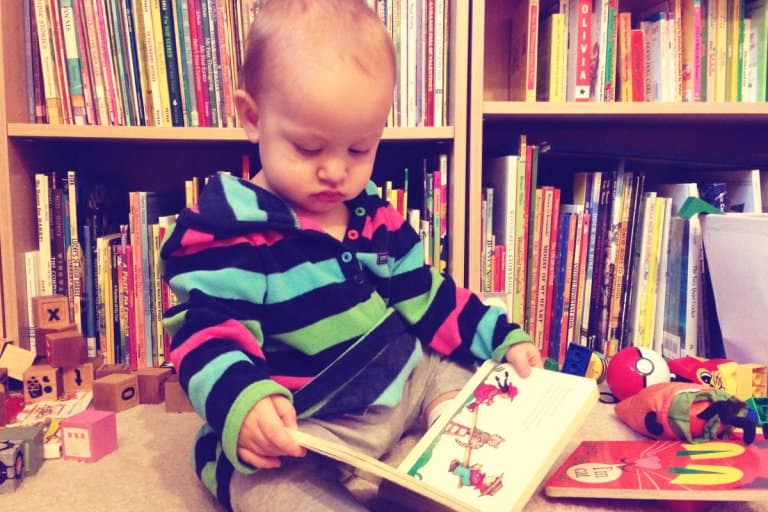The Benefits of Using Nursery Rhymes for Your Homeschool Preschooler

I remember the endless banter of nursery rhymes when my older two children were toddlers. After hearing “Humpty Dumpty” for the 700th time, I felt like I would go insane. Until I heard the words of my father-in-law explaining to me how important nursery rhymes are to your child’s growth, development and education. I gained a new respect for what is really going on in a preschooler’s mind.
So what is it that your child is gaining from the repetitive sing-song storytelling that is driving you insane?
What is the value of nursery rhymes in the life of a homeschool preschooler?
Enhanced Speech Control
Nursery rhymes provide a great opportunity for your child's speech and language to develop further and faster than regular speech can provide. They help your child develop important auditory skills that are essential to the development of clear speech, starting with automatically recognizing and discriminating between sounds. They also help your child articulate words that are difficult to learn and improve the transition during consonant blends.
Your child is also learning how to utilize their voice modulation, which encompasses pitch changes, vocal volume changes, and verbal inflection, which is a necessary component in communication. Nursery rhymes also help your child learn to properly enunciate their words, developing cleaner language patterns. Since they are learning this in a fun way, they are not afraid of drawing criticism for not getting the sounds right initially, which relieves some pressure from the learning experience.
Nursery rhymes can provide your child their first glimpse into the art of reciting learned phrases, which is an extremely important skill that they will use throughout their education experience. This is the beginning of their trip for memorizing information. Later, they use this skill to recite planets, multiplication problems and answers, and grasping large amounts of content to perform well on tests.
In order to develop the capacity to say more complicated words as they grow older, the muscles in the mouth, throat, and tongue have to develop muscle tone. By saying these rhymes with complicated sound blends, your child is developing these muscles.
Another skill in this category that your child is developing is listening comprehension. Typically, this basic foundation skill is skipped over. However, by introducing your homeschool preschooler to nursery rhymes, you can ensure that they develop this extremely important skill that will later develop into reading comprehension.
Intricate Language Development

Nursery rhymes help your child increase their vocabulary. They provide your child with the ability to use words that are not used in their everyday life, like “porridge” and “fetch.”
Over time, your child learns language patterns they are not usually exposed to until later in life.
Nursery rhymes are an excellent choice for exposing your child to concepts they will not be able to fully appreciate until much later in their education. They provide an insight into:
- Poetry
- Spelling
- Mathematics
- History
- Memorizing information
- Alliteration
- Onomatopoeia
- Imagery
Faster Development
Nursery rhymes help your child develop skills that would typically take years to develop. However, the sing-song way they were developed, and the verbal patterns they follow, children are able to pick up on them pretty easily.
Learning these simple wordplay songs will help your children develop more focused physical development, increase their cognitive development, and develop more positively both socially and emotionally.
Focused Physical Development
Since most nursery rhymes describe the characters and items moving around, children are happy to perform the movements in the rhyme. This helps them develop more controlled movements, better fine motor skills, and better coordination.
Nursery rhymes that involve little finger plays, like “The Itsy Bitsy Spider,” help your child fine tune their small muscle motor skills, which is essential to developing better hand-eye coordination.
Increased Cognitive Development
 The repetition that is characteristic of nursery rhymes is a great way to work out your child's brain. It teaches them how to use language and how to develop memories from chunks of verbal information. This is an extremely important skill to instill in your child before they leave preschool. This skill is used throughout their educational experience and in their future work environment.
The repetition that is characteristic of nursery rhymes is a great way to work out your child's brain. It teaches them how to use language and how to develop memories from chunks of verbal information. This is an extremely important skill to instill in your child before they leave preschool. This skill is used throughout their educational experience and in their future work environment.
Nursery rhymes help your preschooler learn the skill of inferencing. It allows them to be exposed to new words, both verbally and through reading. These inferencing skills will come in handy later on when they encounter a word they are not familiar with and allows them to use context clues to determine the meaning of the word.
Because the verses in nursery rhymes are composed of patterns, they are pretty easy to learn. This is your child's first experience with memorizing large chunks of information in a short period of time.
Highly Developed Social and Emotional Capabilities
Nursery rhymes give your child the chance to develop their own emotional connection to situations and grow their sense of humor. Your child will learn how to connect words, rhythm, and movement which is important to their ability to put words to a melody later in life.
Nursery rhymes teach children skill sets. One of these skill sets directly relates to social skills, that otherwise would take years to develop.
Nursery rhymes can also help your child develop a sense of comfort in unfamiliar places. Because they are a comforting behavior from home, your child will be able to soothe themselves with these sing-song rhymes.
Get a Head-Start on Their Education
Even though your child is completely unaware of it, their use of nursery rhymes is helping them develop a base to their future education. While they are repeating nursery rhymes, your child is building the foundation for learning to read, breaking into math concepts, learning about history, and expanding their ability to be creative.
Improved Reading Skills
Nursery rhymes have a strong relationship with the development of reading skills. They also provide your child with the chance to take the role of the storyteller and give them experience in working with the different parts of a story.
Many nursery rhymes are broken down into sections, promoting the development of concepts like beginning, middle, and end of a story. This teaches your child the basics of sequencing pieces of a story. It has been proven that becoming familiar with nursery rhymes while in preschool improves a child's early reading development, regardless of social class, or any other background situation.
Because of the sing-song nature of nursery rhymes, your child also has a chance to work with the phonetic pieces of different words which will help them break down words to better understand what they are reading later.
Even though we typically do not associate the two, nursery rhymes are your child's first exposure to poetry. Some of the poetry hidden in nursery rhymes can be very complex.
In-depth Creativity
Nursery rhymes allow your child to use their imagination. It allows them to create imagery and attach it to words and concepts. They also help to develop your child's ability to act out scenes, especially when the nursery rhyme has a physical action that is associated with it, like the hand movements used in “The Itsy Bitsy Spider.”
A Head Start on Math Skills
Nursery rhymes contain patterns. These patterns do not only contain lessons surrounding speech. Many nursery rhymes contain sequencing patterns, expose your child to numbers, and even expose them to counting for the first time.
To increase their mathematics further, nursery rhymes not only teach your child to count forward. They also teach them to count backward.
Through these valuable rhymes, your child will also be exposed to math concepts like weight and size, along with other math vocabulary terms.
Who knew that nursery rhymes could be your child's first exposure to math concepts.
Grasp a Concept of History
The verses in nursery rhyme not only help your child develop the skills mentioned here, but they also help preserve and pass down culture. The verses found in nursery rhymes have been passed down through generations. Some of these nursery rhymes have been in existence for centuries. Many of them carry lessons about the way lives used to be, that we do not grasp because we did not live through the cultural situations that are described.
These nursery rhymes are your child's first exposure to history and information from the past. It also allows them to develop a better concept of time, and expand their horizons beyond the here-and-now. It provides them a direct link between the time they were born and the people who lived before them, even if they do not realize that it is happening.
Who knew that nursery rhymes provided a homeschool preschooler with so much knowledge? I hope that bringing to light the amazing benefits provided by nursery rhymes encourages parents to continue passing down the joy and knowledge they contain. It is amazing to consider that something we commonly overlook, or we find to be annoying, is so important to the development of a child in preschool. Now that you know the true power behind the nursery rhymes your child has repeated thousands of times, they aren't as annoying as they were yesterday.







Leave a Reply